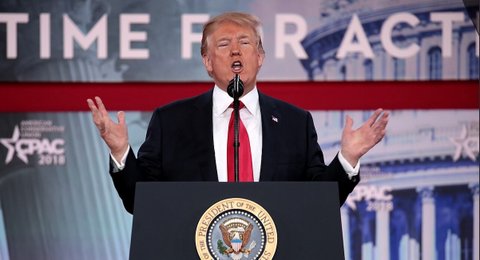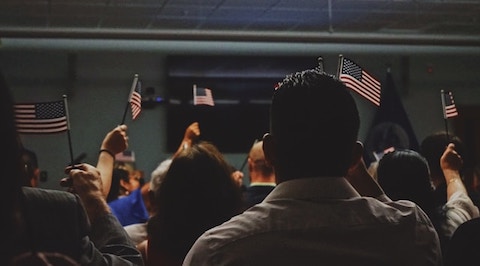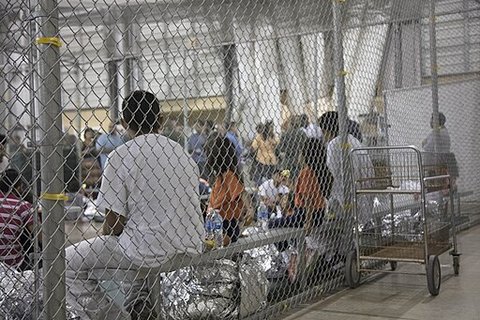
31 Jan ‘America as We Knew it’—Ethnic Media on Trump’s First Week in Office

President Donald Trump speaking at the 2018 Conservative Political Action Conference in National Harbor, Maryland. (Photo via Wikimedia Commons)
By Anthony Advincula, Ethnic Media Services
Hours into his second presidential term, Donald Trump issued dozens of executive orders related to immigration, including declaring a national emergency at the southern border and suspending the refugee and asylum admissions program.
Over the following days, Trump issued orders on a wide range of issues from birthright citizenship to DEI in federal hiring and withdrawing the U.S. from international participation on climate and global health, just to name a few.
Experts say the orders on immigration, in particular, are part of a broader “shock and awe” campaign intended to frighten migrant communities as the administration works to thoroughly revamp—or completely undo—America’s immigration system.
The orders leave tens of thousands in limbo outside the U.S. and have stoked fear in immigrant communities across the country. EMS asked ethnic media reporters and editors to weigh in on how the communities they serve are responding to Trump’s actions.
‘Go to work or stay home’
The Pakistani American community—particularly those without legal documentation—is worried about the Trump administration’s immigration agenda, says Mohsin Zaheer, publisher and editor of Urdu News.
That concern extends even to those without any criminal record, he says, who fear they may be detained during the anticipated raids by Immigration and Customs Enforcement. Countless families are now asking themselves, “Should we go to work or stay home.”
Zaheer adds there is also concern around legal immigration processes, including possible delays in cases related to sponsorship of parents, spouses, children, etc. Trump has repeatedly expressed his desire to limit legal immigration pathways.
The administration’s proposal to end birthright citizenship has added to the litany of questions and concerns across the Pakistani community, notes Zaheer. Twenty-two states, including California, are suing the administration over its effort to end birthright citizenship, which experts say is blatantly unconstitutional.
We are very scared
That’s the overriding sentiment among Latino residents in Trenton, New Jersey, says Carlos Avila, publisher and editor of El Latino News. “We know that at any moment they (ICE) could detain us and deport us,” said Avila, quoting a local community member.
As in the Pakistani community, Latinos in Trenton and other parts of the country are limiting activities outside the home, avoiding streets, shopping malls, as well as schools and churches—which the Trump administration ordered are no longer off limits to immigration enforcement—and other public places where they run the risk of encountering immigration agents.
“When that happens, we must stay quiet and seek legal representation,” Avila continued, acknowledging that some Latinos continue to hold out hope that Trump will deliver on his promise to improve the economy while tightening immigration.
That may prove tricky. Trump’s proposed mass deportation targeting some or all of the nation’s estimated 11 million unauthorized immigrants could cost upwards of $88 billion annually, according to the American Immigration Council, or $967 billion over the course of a decade, which is the minimum time likely needed to complete the program.
Beyond these direct costs for things like detention centers and beefed-up ICE and CBP personnel, such a program is estimated to reduce US GDP by between 4.2% and 6.8% and lead to billions in lost tax revenue. Unauthorized immigrants paid $46.8 billion in federal taxes and $29.3 billion in state and local taxes in 2022 alone.
Making life impossible
“As we saw in the last election, many Latinos in New Jersey voted for Trump despite his anti-immigrant rhetoric,” says Kleibeel Marcano, editor in chief with Reporte Hispano. “Several people I interviewed before the election who supported Trump claimed that the promise of large raids and deportations was just campaign rhetoric.”
It’s a view shared among many, notes Marcano, despite Trump’s actions beginning on day one of his presidency indicating his intention to “deport as many immigrants as possible, with or without criminal records, and to make life impossible for undocumented immigrants.”
Marcano says concerns are growing, and that advocacy groups and community organizations in his area are organizing in response to educate the community and resist the anticipated attack.
Ending humanitarian parole
“The early days of the second Trump administration have brought to life what many of us feared,” says Carlos Roa of Telecuento News in Kansas City, Missouri. “The demonization of the Latino immigrant community to put on a show for his voter base.”
According to Roa, the elimination of humanitarian parole programs for Cubans, Haitians, Nicaraguans, and Venezuelans “proves that this is not just about undocumented immigrants, as some argued, but about the entire community.”
Roa also points to the removal of Spanish-language resources from the White House website, which he says “carries significant weight regarding how this administration views Latinos.”
‘Some support for mass deportation’
Rong Xiaoqing, senior reporter with the Chinese-language Sing Tao Daily in New York, says there is support for Trump within the immigrant Chinese community despite the president’s past harsh—even racist, by some accounts—rhetoric targeting China and by extension Chinese.
“Asylum seekers are in fear,” says Rong, given Trump’s order ending asylum claims at the US southern border.
But she notes, there is some support for his mass deportation campaign.
“I did a story yesterday about a group of Chinese who went to Washington, DC to see the inauguration ceremony,” says Rong. “These are Trump supporters. They worked in Pennsylvania to do canvassing for him. They got tickets… stood in the queue before the sun was up, waited for four hours, and still didn’t get in because the seats were quickly filled.”
That did not dampen their enthusiasm for Trump, continued Rong. “They expect him to bring this country back on track,” she said, adding these are “die hard” Trump supporters.
Whether their views are reflective of the broader Chinese American community is less clear, though there does appear to be growing disillusionment with Democrats, with influential groups including in San Francisco throwing off the Democratic brand they had long identified with.
‘The people have spoken’
Mark Tyler is founder and publisher of Atlantic City Focus, which serves African American communities in New York, New Jersey and Philadelphia. He says many are taking a “hands off” approach to Trump’s first days and weeks in office.
“They seem content to let the larger community see Trump for what he is,” said Tyler. “The people have spoken, now let them feel.”
On Thursday, Trump signed an executive order, “Ending Illegal Discrimination and Restoring Merit-Based Opportunity,” which in essence repeals a series of executive orders going as far back as President Lyndon Johnson’s administration that call for prioritizing DEI in federal hiring and contracting programs.
The order has led to the shuttering of federal DEI offices, putting in jeopardy employment for thousands of federal workers.
Writing for Word in Black, author Keith Boykin notes African Americans are overrepresented in the federal workforce precisely because of these anti-discrimination efforts.
Boykin call’s Trump’s executive order on DEI an “attack on Black America.”
Making America Great Again, With a Marker
“Nothing Trump said Monday surprised me other than he finally spoke the truth about his intentions to make America great again with his magic marker,” says Alice Tisdale, publisher and founder of The Jackson Advocate in Jackson, Mississippi. “Poof! America as we knew it — gone!”
EMS editor Peter Schurmann contributed reporting for this story.






No Comments